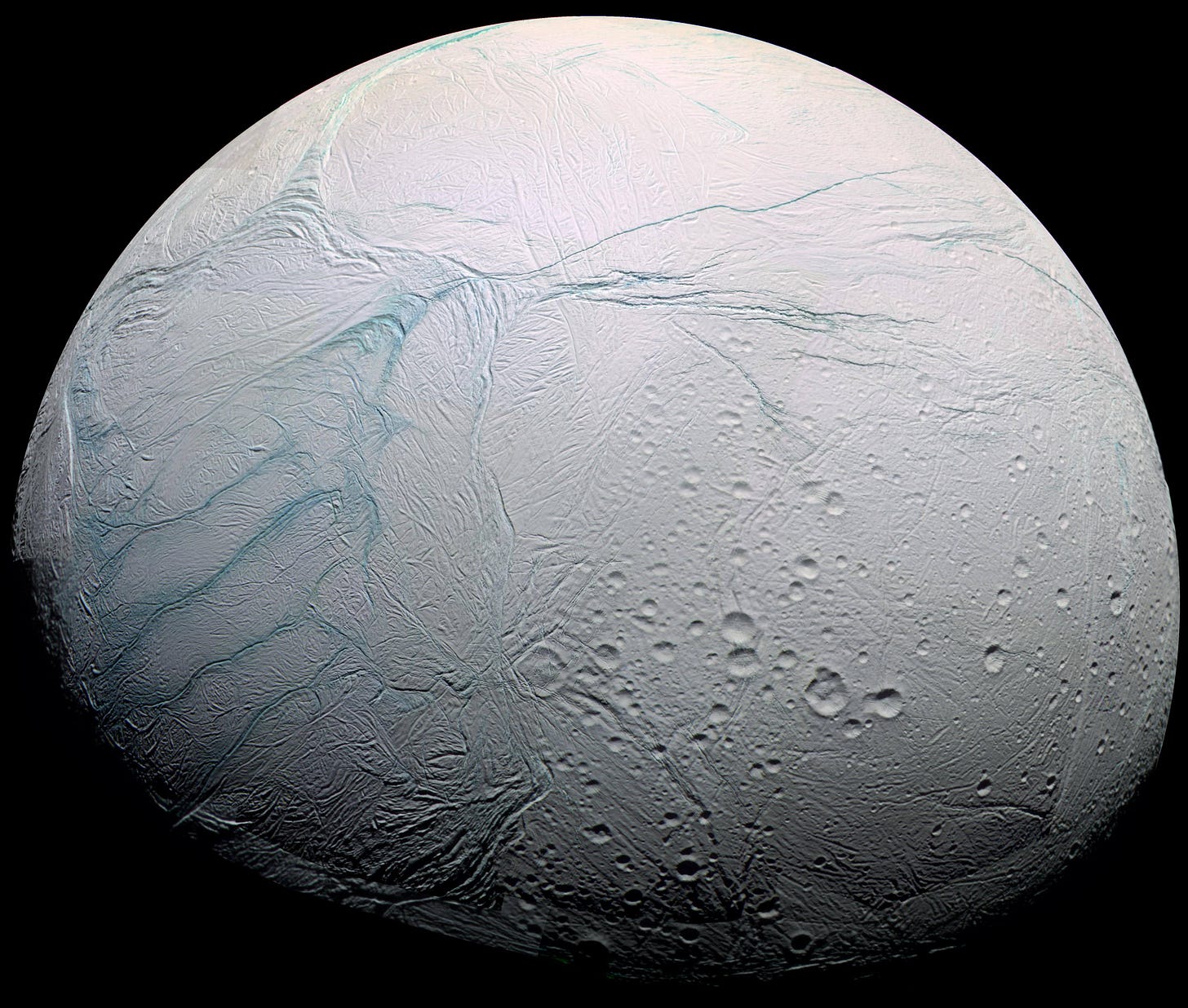142: TSMC, Nvidia, Premature Optimization, Amazon & Private Label Brands, Backup Now!, One of Saturn's 82 Moons, 10 Remote Jobs at the Same Time, and Offset Years
"One of the interesting things about Nvidia is all the gardening going on."
The most dangerous error is failure to recognize our own tendency to error. That failure is a common affliction of authority.
—B.H. Liddell Hart
💡 Try to get the big decisions right, and then optimize.
In software, there’s a concept called “premature optimization”. It’s considered such a blunder that there’s a famous Donald Knuth speech where he called it “the root of all evil” (I don’t think he meant that literally).
It’s very easy to spend a lot of time & energy working on making small stuff better when it would be much more fruitful to instead make sure the big things are correct, or even that you’re working on the right big things to begin with.
ie. You don’t want to spend 2 weeks optimizing a sub-routine and fixing small bugs only to then realize that there’s a whole better approach to doing things, so you have to throw out that whole chunk of code and restart with a new approach.
So instead of buying organic goldfish crackers, maybe decide to eat some mixed nuts in the first place…
🛀 When it comes to human nature, look for truth, not originality.
Every line about humans has been said a thousand times, because we don't change.
📞 🇨🇦 In edition #84 I shared my thoughts on Public Mobile, a discount phone carrier here in Canada.
Most regular carriers make the wrong trade-offs for me. I don’t need a fast connection, I just need one where I don’t have to worry about running out of data. Yet all the cheap plans at major carriers will keep your speed maxed out, but reduce your data to tiny amounts (500megs).
So I found Public Mobile, which is a division of Telus, and they adjust the dials in a way that better fits my needs: They give you a slower speed (basically capped around 7mbps, even though it’s a LTE connection), but plenty of data (2.5gb/month for less than $30 CAD, which will sound insane to Americans and Europeans, but is good for Canada).
Anyway, I don’t write this just to recap that post, but to talk about the very interesting psychological phenomenon that I’ve been noticing with these type of bargains.
Why is it that it’ll sometimes feel better for me to save a few bucks a month by moving to a different carrier than it does to make orders of magnitude more on a stock investment?
A reader recently signed up for Public Mobile using my referral code P0KNQX (feel free to use it too! here’s how), so they got a $10 CAD rebate and I get $1/month off my bill.
Somehow the joy I felt at this was totally out of proportions to the monetary value.
Why is that?
I think it may be because with a stock investment, it's drawn-out over the research period and the holding period, months and years, and there’s usually not a single moment where you feel you “got it” (and even when there is, my internal emotional reactions to investing tend to be pretty muted nowadays... I used to get more excited in both emotional directions when I was a beginner).
Some of these bargains prob feel disproportionally good for their size because they’re more certain.
When you buy a stock, it’s all probabilistic, nobody knows the future, you’re guessing about ranges of outcomes.
When you buy a 10-liter container of dishwasher soap from Costco, you can do the math and be sure it’s 34% cheaper than buying the small container at the grocery store.
The gamification aspect also has to play a role. Getting referral discounts feels like increasing my character level in a RPG game, somehow. ⚔️
💚 🥃 I can live without this newsletter, and so can you. But why would we? Thank you for your support:
Investing & Business
Nvidia acquires DeepMap, a startup building 'centimeter-level precision’ maps for autonomous vehicles
One of the interesting things about Nvidia is all the gardening going on.
Jensen Huang first planted the gaming acorn a long time ago, and it grew into a strong and beautiful tree. But he didn’t stop there. 🌳
Over the years, he also planted other seeds, and they’ve all been developing at varying rates… What used to be the data-center shrub is now a huge tree that’s getting a lot of attention lately, but there’s a bunch of other saplings. 🌱🌱🌱
I wrote about some of them recently (f.ex. Omniverse in edition #140). One that could become pretty big someday is the self-driving elderberry bush (Sambucus).
Here’s what I highlighted about it in edition #136:
Our automotive design win pipeline now exceeds $8 billion through fiscal 2027. Most recently, Volvo Cars announced that it will use NVIDIA DRIVE Orin, building on our next great momentum with some of the largest automakers, including Mercedes Benz, SAIC and Hyundai Motor Group. [...]
In robotaxis, we added GM Cruise to the growing number of companies adopting the NVIDIA DRIVE platform, which includes Amazon Zoox and DiDi.
We've also had a great traction with new energy vehicle makers. Our latest wins include Faraday Future, R Auto, IM Motors and VinFast, which joined previously announced wins with SAIC, NIO, Xpeng and Li Auto. In trucking, Navistar is partnered with TuSimple in selecting NVIDIA DRIVE for autonomous driving, joining previously announced Volvo Autonomous Solutions and Plus.
A billion here, a billion there, and pretty soon you have a real business.
The latest addition to this leg of the stool (I think I’m starting to mix too many metaphors) is a startup acquisition:
NVIDIA has agreed to acquire DeepMap, a startup dedicated to building high-definition maps for autonomous vehicles to navigate the world safely. [...]
Maps that are accurate to within a few meters are good enough when providing turn-by-turn directions for humans. AVs, however, require much greater precision. They must operate with centimeter-level precision for accurate localization, the ability of an AV to locate itself in the world.
Proper localization also requires constantly updated maps. These maps must also reflect current road conditions, such as a work zone or a lane closure. These maps need to efficiently scale across AV fleets, with fast processing and minimal data storage. Finally, they must be able to function worldwide.
DeepMap was founded five years ago by Wu and Mark Wheeler, veterans of Google, Apple and Baidu, among other companies. The U.S.-based company has developed a high-definition mapping solution that meets these requirements and has already been validated by the AV industry with a wide array of potential customers around the world.
Putting more pieces of the puzzle together.
Strike While the Iron’s Hot, TSMC Edition
Taiwan Semiconductor Manufacturing Co. is considering building another advanced plant in the U.S., as the world's biggest contract semiconductor supplier responds to Washington's desire to bring more of the tech supply chain onto home turf.
The new plant would carry out chip packaging, using advanced technology to integrate different types of semiconductors onto wafers. Innovation in packaging chips is emerging as an industry battleground for TSMC and rivals including Intel and Samsung, and this would be TSMC's first such facility outside Taiwan. (Source)
How does this make sense?, Offset Fiscal Year Edition
Am I the only one who hates offset fiscal years?
Any benefits that companies get from them offsetting end-of-year activities to some less busy period or whatever has to be outweighed by nobody knowing what is when anymore…
I mean, and how about something like this:
Crowdstrike [...] results for the first quarter fiscal year 2022, ended April 30, 2021.
So in June 2021, they’re releasing their results for “First Quarter Fiscal 2022”? They wrapped up their entire 2021 fiscal year in March 2021?!
This isn’t even a seasonal business, and they’re almost a year ahead, but have this weird 1-month offset within the year too? Are they just messing with us?
Maybe a florist needs an offset fiscal year so they’re not compiling paperwork during Valentine’s day, but a steady-eddy saas company?
Update: Fat Tail Capital explains some of the reasons why on-prem software companies had that offset month and why it may still be around — I knew there had to be reasons and it wasn’t entirely random, but I still don’t like it.
Offset by 1 month? Maybe. Offset by almost a full year so that the year number doesn’t even match with the calendar year most of the time? What’s the point?
Regulators Mad at Amazon, Edition #7,345
Hey Aldi, Come to Canada Please!
House lawmakers are preparing to propose bipartisan legislation that could require Amazon and other technology giants to effectively split into two companies or shed their private-label products [...]
“It shall be unlawful for a covered platform operator to own or control a line of business, other than the covered platform, when the covered platform’s ownership or control of that line of business gives rise to an irreconcilable conflict of interest.” That language could change in the bill’s final draft. [...]
The bulk of the legislation is narrowly focused only on big technology companies. The definitions of companies targeted by the bills state that they must have a market capitalization of $600 billion or more, must have more than 500,000 active monthly users and must be a critical trading partner. (Source)
Are lawmakers forgetting that private labels are generally good for consumers? They increase competition, help keep prices low, and provide a usually-cheaper alternative to those who are poorer and/or less brand-conscious (🙋♂️).
Do they think that Costco or Walmart don’t have plenty of information about what sells well in their stores when they decide what to make as store brands? That they don’t have leverage over their suppliers? I get 3P is different from 1P, but the end-result competition is pretty similar.
h/t Wall St. Dropout
Supply & Demand, right?
h/t Nick (🔐)
Science & Technology
Do you backup? I sure hope you do!
Wow! Eyeballing it, looks like almost 50% of computer users surveyed here never backup, or do it about yearly.
Yikes.
This is your reminder to backup your data. This is the closest thing we have to backing up our brains, and if we could do that, you’d be crazy not to do it.
My recommendation is to get an external hard-drive and have a local backup there (on a Mac it’s pretty easy with Time Machine, you can have snapshots taken ever hour, it just saves the diffs (what changed) since the last one, it doesn’t start over every time), and then also have a cloud backup in case your house burns down or some other catastrophe befalls you.
Personally, I use BackBlaze for cloud backup.
Been with them for years and don’t have anything bad to say. I also pay for extra iCloud storage on a family plan and have all my family’s devices backup every night (mostly to make sure we have all photos safely off-site).
While at it, if you’re on a desktop computer (not a laptop), get an uninterruptible power supply (UPS).
It’s like a big power bar, but it contains a battery that will keep your computer running if there’s a power failure. It protects your hardware the way a surge protector would, but it also avoids data loss, and generally makes for a more pleasant experience than having whatever you’re working on in a state of flow disappear abruptly.
Enceladus, One of Saturn’s 82 Moons
the sixth-largest moon of Saturn. It is about 500 kilometers (310 mi) in diameter [...]
Enceladus is mostly covered by fresh, clean ice, making it one of the most reflective bodies of the Solar System. Consequently, its surface temperature at noon only reaches −198 °C (−324 °F), far colder than a light-absorbing body would be. [...]
In 2005, the Cassini spacecraft started multiple close flybys of Enceladus, revealing its surface and environment in greater detail. In particular, Cassini discovered water-rich plumes venting from the south polar region.
Cryovolcanoes near the south pole shoot geyser-like jets of water vapor, molecular hydrogen, other volatiles, and solid material, including sodium chloride crystals and ice particles, into space, totaling about 200 kg (440 lb) per second. Over 100 geysers have been identified. Some of the water vapor falls back as "snow"; the rest escapes, and supplies most of the material making up Saturn's E ring. (Source)
Cryvolcanoes? hundreds of geysers exploding water and sodium chloride crystals into space? How cool is that?
And snow?
Oh wait, where have I heard of a snow planet before…
The Arts & History
Fireside Chats
Social media, for all its faults and magnificent quirks, is a way for people to bypass gatekeepers and talk to others directly.
I was reading a transcript of a company presentation, and for the hundredth time they referred to the format as a “fireside chat format”, and I always thought that was just a nice image… But I wasn’t sure, so I looked it up, and turns out the expression is strongly linked to FDR and his use of radio:
The fireside chats were a series of evening radio addresses given by Franklin D. Roosevelt, the 32nd President of the United States, between 1933 and 1944. Roosevelt spoke with familiarity to millions of Americans about recovery from the Great Depression, the promulgation of the Emergency Banking Act in response to the banking crisis, the 1936 recession, New Deal initiatives, and the course of World War II. On radio, he was able to quell rumors, counter conservative-dominated newspapers and explain his policies directly to the American people. His tone and demeanor communicated self-assurance during times of despair and uncertainty. Roosevelt was regarded as an effective communicator on radio, and the fireside chats kept him in high public regard throughout his presidency. Their introduction was later described as a "revolutionary experiment with a nascent media platform."
That reminds me a lot of what has been said about Twitter in recent times…
Maybe it’s not why analysts use the term at these events, maybe they just like the image that evokes a more casual conversation — but I still learned something.










